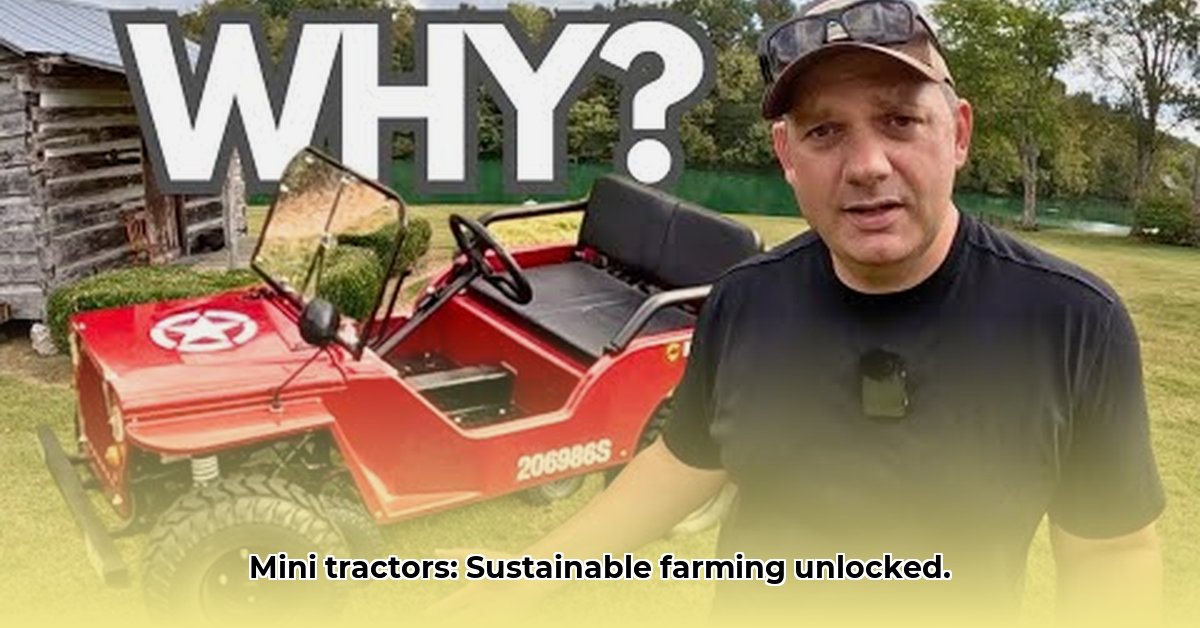
Tractor Supply Mini Tractors: A Preliminary Assessment of Sustainability
Are small-scale tractors from Tractor Supply Company (TSC) a viable tool for sustainable agriculture? This question, while seemingly straightforward, reveals a significant gap in our current understanding. While TSC offers mini-tractors and mini-bikes marketed towards small-scale farmers, comprehensive data on their environmental impact remains elusive. This article explores the potential benefits and significant limitations of these machines in building a sustainable agricultural future. For more information on mini-motorcycles, check out this resource.
The Current Landscape: Uncertainty Amidst Promise
Currently, publicly available information about the environmental performance of TSC mini-tractors is limited. We know they exist and are being sold, but crucial data points are missing. This lack of transparency hinders a comprehensive assessment of their potential role in sustainable farming practices. What are their fuel efficiencies? What are their greenhouse gas emissions over their entire lifecycle? What is the impact of their manufacture and eventual disposal? These unanswered questions prevent a definitive statement on their sustainability.
Potential Applications in Sustainable Agriculture: A Speculative Outlook
Despite the data scarcity, the potential applications of TSC mini-tractors in sustainable agriculture are intriguing. For small-scale farms, these compact machines offer several potential advantages:
Reduced Fuel Consumption: Mini-tractors, by their nature, require less fuel than their larger counterparts, potentially lowering operating costs and reducing the overall carbon footprint per acre cultivated. However, this remains speculative without precise fuel consumption data for different models under various operating conditions.
Precision Farming: The maneuverability of mini-tractors could facilitate precision application of fertilizer and pesticides, minimizing waste and reducing environmental impacts associated with over-application. The effectiveness of this application relies on having appropriate precision technology implemented on these tractors, which needs to be verified independently.
Minimized Soil Compaction: The reduced weight of mini-tractors compared to larger models might lessen soil compaction, preserving soil health and promoting long-term sustainability. This presumption needs confirmation through field studies comparing soil compaction levels under various tractor types.
The Sustainability Gap: A Critical Need for Data
The significant lack of publicly available data poses a considerable barrier to assessing the true sustainability of TSC mini-tractors. To make a factual case, we need comprehensive research focusing on several key areas:
- Fuel Efficiency: Detailed testing across different models and operating conditions is crucial to establish baseline fuel consumption rates.
- Greenhouse Gas Emissions: A complete greenhouse gas emission profile, including manufacturing, operation, and disposal phases, is vital for understanding their carbon footprint.
- Lifecycle Assessment (LCA): A comprehensive LCA will provide a holistic view of the environmental impact, including resource depletion and waste generation.
- User Feedback: Gathering data from farmers regarding actual fuel usage, maintenance needs, and overall satisfaction will provide critical real-world insights into the efficacy and sustainability of these mini-tractors.
A Call to Action: Unveiling the Truth Through Collaborative Efforts
To fully understand the sustainability of TSC mini-tractors, a multi-pronged approach is necessary:
TSC Data Transparency: The company should publicly release detailed specifications, including fuel efficiency ratings, emissions data, and material composition information for its mini-tractor models.
Independent Research: Funding should be allocated for independent third-party research to validate TSC's claims and conduct comprehensive LCAs and field trials comparing these mini-tractors to other farming methods.
Farmer Involvement: A system for collecting feedback from farmers, including detailed operational data, should be implemented to provide real-world perspectives on the environmental and economic performance of these machines.
By combining data from these sources, we can build a reliable picture of the actual sustainability of TSC mini-tractors. Until such data is available, assertions regarding their environmental benefits remain speculative.